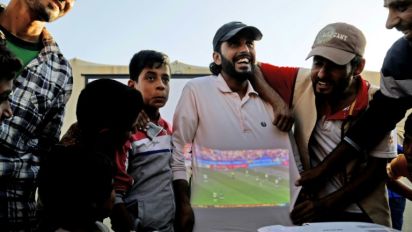Displaced Syrians find relief in tent-side World Cup screenings

DAMASCUS (AFP)- At a camp for the displaced in northern Syria, men and boys huddled near a projector to watch some of the world's best footballers play on the side of a tent.
Throughout the championship, a local charity is screening all matches for free at the Ain Issa camp for the displaced in the northern province of Raqa.
"Showing the World Cup at the camp is such a beautiful initiative because it draws people out of their torment," spectator Abdallah Fadil al-Ubayd said.
"Everybody loves football," said the 38-year-old, dressed in a red sports T-shirt to watch Mexico play Germany .
As the players dashed across the portable screen, the commentator's voice boomed out from loud speakers and across surrounding tent tops.
When Mexico scored, the cheers of dozens of spectators rose up above the camp.
Ubayd used to play for a local team in his hometown of Maskana in the northern province of Aleppo.
An 'extremely hard' time
Within the hot tent, children sit by their fathers, gazing up at the figures running on the screen.
Some carry a pillow on which to rest during the game, while others lay a piece of material on the ground to sit on.
Outside, Mubad al-Mohammad, 23, says the World Cup this year comes at a time of his life that is "extremely hard".
The young man has been living in a tent at Ain Issa for more than a year after fleeing his home city of Raqa.
'Miss the excitement'
"It's so hot and we miss our friends, the excitement of watching games," said Mohammad.
He said he followed the last World Cup from home in Raqa .
Nearby, Abdallah Abdelbasit, 47, said he was delighted the camp's footballers could follow their teams on the big screen.
Nicknamed Abu Ashraf, the man with a neatly trimmed grey beard and haircut still plays himself and has been active in organising the camp's youth into teams.
The free screenings were very welcome, he said, especially after attending fixtures at a local cafeteria proved to be too expensive for many camp residents.
With three World Cup matches a day, the initiative fills "the void and boredom", allowing spectators to "forget some of their troubles", he said.
But enthusiasm this year is still not the same as for previous championships, said Abdelbasit, who claims he has followed games for the past 30 years.
"Before there used to be great excitement and cheering, but at the camp the spectators don't clap except if a goal is scored."
"We hope to watch the next World Cup in our homes," he said.







